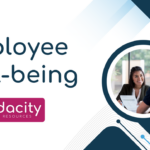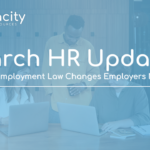4 HR Trends to Keep on Your Radar: Spring 2023
In like a lion, out like a lamb? As March arrived with snow across much of the northern regions of tha nation, we hope this age-old weather folklore will ring true this year! As we transition from winter to spring, here are a few HR trends employers should have “on their radar” (no pun intended!).
Overtime Decision & The FLSA
HR Trends. In Helix Energy Solutions Group, Inc. v. Hewitt, the U.S. Supreme Court determined a highly compensated employee paid on a daily-rate basis was entitled to overtime compensation pursuant to the Fair Labor Standards Act (FLSA). The Court concluded the employee (Hewitt) did not meet the salary-basis requirement under the FLSA because he was paid a daily rate and not guaranteed a fixed weekly amount.
Employers that utilize a daily rate should examine their protocols to ensure compliance with the Court’s decision. It is now clear that employees (even if they are highly paid as Hewitt earned over $200,000 per year) paid on a daily-rate basis are entitled to overtime and do not meet the salary-basis test for a white-collar exemption from overtime under the FLSA.
Public Health Emergency Ending in May
HR Trends. The Biden administration announced the COVID-19 public health emergency (PHE) and national emergency will end May 11th. Employers should be planning for the transition as several aspects impact the workplace, including COVID-19 testing and vaccinations.
FTC Proposed Rule
HR Trends. The Federal Trade Commission (FTC) extended the public comment period to April 19th for its proposed rule to ban employers from utilizing non-compete agreements.
The rule would apply to all employers, regardless of size (except for certain entities exempt from coverage under the Federal Trade Commission Act).
The FTC argues that non-compete clauses constitute an unfair method of competition and therefore violate Section 5 of the Federal Trade Commission Act.
In February, the FTC issued an order settling charges against two employers for “illegally imposed noncompete restrictions on workers across a variety of positions” and prohibiting enforcement of said noncompete agreements.
At the State level, the Minnesota legislature is considering two companion bills (HF295 and SF405) that if passed would ban all non-compete agreements with Minnesota employees who make less than a certain salary threshold and would require “garden leave” payments for higher income earners. The phrase “garden leave” refers to payment provided to employees forced to sit out employment during a restricted period pursuant to a non-compete.
Several states already restrict or outright ban the use of non-competes, including: California, Colorado, Illinois, Maine, Maryland, New Hampshire, North Dakota, Oklahoma, Oregon, Rhode Island, Virginia, and Washington.
Pay Equity
HR Trends. Pay equity ensures workers are being rewarded fairly and equitably based on performance, skills, experience, and other relevant job factors. The requirement that employers provide equal pay for equal work has been around for decades based on a number of Federal and State laws, but is getting increased scrutiny and generating national dialogue.
Pay Gap
According to a Pew Research Center analysis released in March of 2023, the gap in pay between male and female workers has not changed much in two decades. In 2022, women earned an average of 82% of what men earned, similar to where the pay gap stood in 2002, when women earned 80% as much as men.
Employers and legislators are taking action to disrupt these sobering statistics.
Pay Transparency
Several states have enacted laws that require employers to provide pay information in job postings, including California, Colorado, and Washington. According to a SHRM (Society for Human Resource Management) study, pay transparency increases recruitment and trust. In fact, 65% of organizations that listed pay ranges on job postings felt it made them more competitive in attracting top talent. In this same study, 82% of U.S. workers were more likely to consider applying to a job if the pay range was listed in the job posting and 73% were more likely to trust organizations that provide pay ranges in job postings.
Pay Disclosure
Every Minnesota employer must comply with Wage Disclosure Protection. This law requires employers to allow voluntary disclosure of wages by employees without fear of discipline or retaliation. Employers that provide an employee handbook to their employees MUST include in the handbook a notice of employee rights and remedies under this law.
Pay History
Restrictions on requesting applicant pay history exist in several states and are gaining traction across the nation. For example, the Oregon Equal Pay law prohibits employers from inquiring about or relying on salary history when setting compensation for new hires. Under a Minnesota proposed rule, employers would be prohibited from asking about an applicant’s pay history.
Proponents for this type of legislation argue that it disrupts disparities in pay when an employer cannot inquire about or use an applicant’s current or past compensation when making pay decisions. If an applicant is illegally paid less based on a protected classification like gender, relying on that rate of pay perpetuates the disparity. Instead, advocates argue employers should make pay decisions based on an internal framework that maintains fair and equitable compensation.
Minnesota Proposed Legislation
HR Trends. Things are heating up in St. Paul. In addition to the proposed rules discussed above, there are several other bills being debated that impact employers.
Earned Sick and Safe Time
A bill (SF34/HF19) to create paid sick and safe leave in Minnesota has been proposed. The language requires that employers with one or more employees provide 1 hour of paid sick/safe time for every 30 hours worked up to a maximum of 48 hours per year. Earned Sick and Safe Time (ESST) ordinances currently exist in Minneapolis, St. Paul, and Duluth.
Paid Medical and Parental Leave Bill
A controversial bill to create paid medical and parental leave has also been proposed. The language of SF2 includes all MN employers and would provide job-protected paid leave after 90 days of employment. Under the plan, employers and employees would pay into a state pool that functions like the unemployment fund.
Marijuana Legalization
A bill to decriminalize possession and use of marijuana by individuals age 21+ (with some exceptions) is being debated and discussed. The bill would create a new state entity to regulate the new law, the already existing medical marijuana program, and recently legalized THC products.
2023 HR Trends: Stay Tuned!
Q1 of 2023 was an active and busy quarter. Stay tuned for future HR trends, developments and laws that impact employers across the nation.
Sources:
https://www.hhs.gov/about/news/2023/02/09/fact-sheet-covid-19-public-health-emergency-transition-roadmap.html
https://www.ftc.gov/news-events/news/press-releases/2023/03/ftc-extends-public-comment-period-its-proposed-rule-ban-noncompete-clauses-until-april-19
https://www.ftc.gov/news-events/news/press-releases/2023/02/ftc-approves-final-orders-requiring-two-glass-container-manufacturers-drop-noncompete-restrictions
https://www.revisor.mn.gov/bills/bill.php?b=House&f=HF0295&ssn=0&y=2023
https://www.revisor.mn.gov/bills/bill.php?b=Senate&f=SF0405&ssn=0&y=2023
https://www.pewresearch.org/fact-tank/2023/03/01/gender-pay-gap-facts/
About the Author
Human Resources thought leader, Stacy Johnston, provides innovative solutions with a mission to support organizations in understanding and engaging their biggest competitive advantage… their employees. Johnston is a licensed attorney and holds the SHRM-CP credentials.
Interested in HR support? Check out the online resources at www.audacityhr.com.
Looking for resources to prevent workplace bullying? Check out our blog posts: Part 1 and Part 2!






